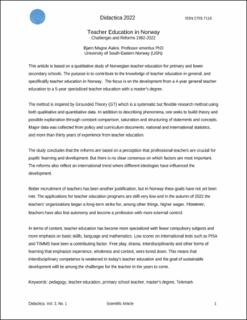| dc.description.abstract | This article is based on a qualitative study of Norwegian teacher education for primary and lower secondary schools. The purpose is to contribute to the knowledge of teacher education in general, and specifically teacher education in Norway. The focus is on the development from a 4-year general teacher education to a 5-year specialized teacher education with a master's degree.
The method is inspired by Grounded Theory (GT) which is a systematic but flexible research method using both qualitative and quantitative data. In addition to describing phenomena, one seeks to build theory and possible explanation through constant comparison, saturation and structuring of statements and concepts. Major data was collected from policy and curriculum documents, national and international statistics, and more than thirty years of experience from teacher education.
The study concludes that the reforms are based on a perception that professional teachers are crucial for pupils' learning and development. But there is no clear consensus on which factors are most important. The reforms also reflect an international trend where different ideologies have influenced the development.
Better recruitment of teachers has been another justification, but in Norway these goals have not yet been met. The applications for teacher education programs are still very low and in the autumn of 2022 the teachers' organizations began a long-term strike for, among other things, higher wages. However, teachers have also lost autonomy and become a profession with more external control.
In terms of content, teacher education has become more specialized with fewer compulsory subjects and more emphasis on basic skills, language and mathematics. Low scores on international tests such as PISA and TIMMS have been a contributing factor. Free play, drama, interdisciplinarity and other forms of learning that emphasize experience, wholeness and context, were toned down. This means that interdisciplinary competence is weakened in today's teacher education and the goal of sustainable development will be among the challenges for the teacher in the years to come. | en_US |
